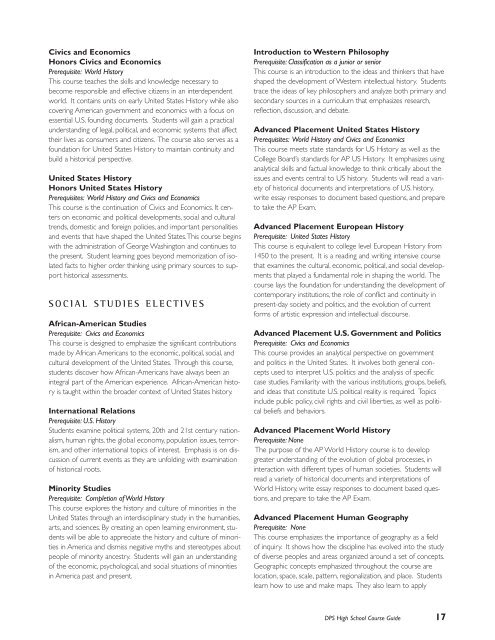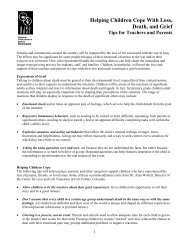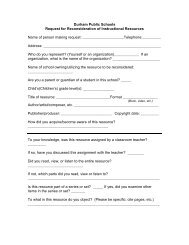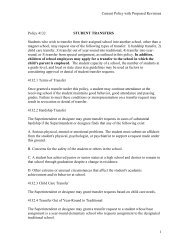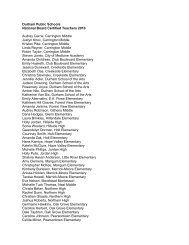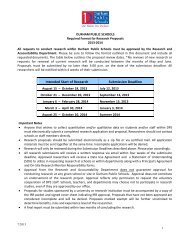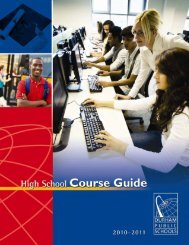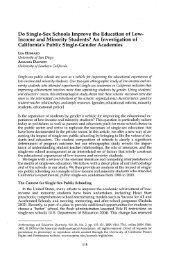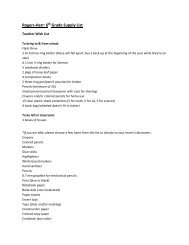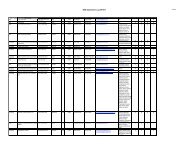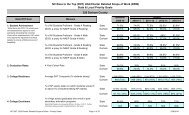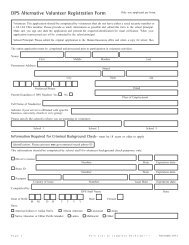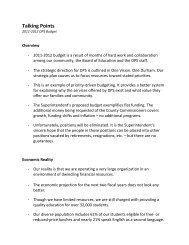2011-12 High School Course Offerings - Durham Public Schools
2011-12 High School Course Offerings - Durham Public Schools
2011-12 High School Course Offerings - Durham Public Schools
Create successful ePaper yourself
Turn your PDF publications into a flip-book with our unique Google optimized e-Paper software.
Civics and Economics<br />
Honors Civics and Economics<br />
Prerequisite: World History<br />
This course teaches the skills and knowledge necessary to<br />
become responsible and effective citizens in an interdependent<br />
world. It contains units on early United States History while also<br />
covering American government and economics with a focus on<br />
essential U.S. founding documents. Students will gain a practical<br />
understanding of legal, political, and economic systems that affect<br />
their lives as consumers and citizens. The course also serves as a<br />
foundation for United States History to maintain continuity and<br />
build a historical perspective.<br />
United States History<br />
Honors United States History<br />
Prerequisites: World History and Civics and Economics<br />
This course is the continuation of Civics and Economics. It centers<br />
on economic and political developments, social and cultural<br />
trends, domestic and foreign policies, and important personalities<br />
and events that have shaped the United States.This course begins<br />
with the administration of George Washington and continues to<br />
the present. Student learning goes beyond memorization of isolated<br />
facts to higher order thinking using primary sources to support<br />
historical assessments.<br />
SOCIAL STUDIES ELECTIVES<br />
African-American Studies<br />
Prerequisite: Civics and Economics<br />
This course is designed to emphasize the significant contributions<br />
made by African Americans to the economic, political, social, and<br />
cultural development of the United States. Through this course,<br />
students discover how African-Americans have always been an<br />
integral part of the American experience. African-American history<br />
is taught within the broader context of United States history.<br />
International Relations<br />
Prerequisite: U.S. History<br />
Students examine political systems, 20th and 21st century nationalism,<br />
human rights, the global economy, population issues, terrorism,<br />
and other international topics of interest. Emphasis is on discussion<br />
of current events as they are unfolding with examination<br />
of historical roots.<br />
Minority Studies<br />
Prerequisite: Completion of World History<br />
This course explores the history and culture of minorities in the<br />
United States through an interdisciplinary study in the humanities,<br />
arts, and sciences. By creating an open learning environment, students<br />
will be able to appreciate the history and culture of minorities<br />
in America and dismiss negative myths and stereotypes about<br />
people of minority ancestry. Students will gain an understanding<br />
of the economic, psychological, and social situations of minorities<br />
in America past and present.<br />
Introduction to Western Philosophy<br />
Prerequisite: Classification as a junior or senior<br />
This course is an introduction to the ideas and thinkers that have<br />
shaped the development of Western intellectual history. Students<br />
trace the ideas of key philosophers and analyze both primary and<br />
secondary sources in a curriculum that emphasizes research,<br />
reflection, discussion, and debate.<br />
Advanced Placement United States History<br />
Prerequisites: World History and Civics and Economics<br />
This course meets state standards for US History as well as the<br />
College Board’s standards for AP US History. It emphasizes using<br />
analytical skills and factual knowledge to think critically about the<br />
issues and events central to US history. Students will read a variety<br />
of historical documents and interpretations of U.S. history,<br />
write essay responses to document based questions, and prepare<br />
to take the AP Exam.<br />
Advanced Placement European History<br />
Prerequisite: United States History<br />
This course is equivalent to college level European History from<br />
1450 to the present. It is a reading and writing intensive course<br />
that examines the cultural, economic, political, and social developments<br />
that played a fundamental role in shaping the world. The<br />
course lays the foundation for understanding the development of<br />
contemporary institutions, the role of conflict and continuity in<br />
present-day society and politics, and the evolution of current<br />
forms of artistic expression and intellectual discourse.<br />
Advanced Placement U.S. Government and Politics<br />
Prerequisite: Civics and Economics<br />
This course provides an analytical perspective on government<br />
and politics in the United States. It involves both general concepts<br />
used to interpret U.S. politics and the analysis of specific<br />
case studies. Familiarity with the various institutions, groups, beliefs,<br />
and ideas that constitute U.S. political reality is required. Topics<br />
include public policy, civil rights and civil liberties, as well as political<br />
beliefs and behaviors.<br />
Advanced Placement World History<br />
Prerequisite: None<br />
The purpose of the AP World History course is to develop<br />
greater understanding of the evolution of global processes, in<br />
interaction with different types of human societies. Students will<br />
read a variety of historical documents and interpretations of<br />
World History, write essay responses to document based questions,<br />
and prepare to take the AP Exam.<br />
Advanced Placement Human Geography<br />
Prerequisite: None<br />
This course emphasizes the importance of geography as a field<br />
of inquiry. It shows how the discipline has evolved into the study<br />
of diverse peoples and areas organized around a set of concepts.<br />
Geographic concepts emphasized throughout the course are<br />
location, space, scale, pattern, regionalization, and place. Students<br />
learn how to use and make maps. They also learn to apply<br />
DPS <strong>High</strong> <strong>School</strong> <strong>Course</strong> Guide 17


